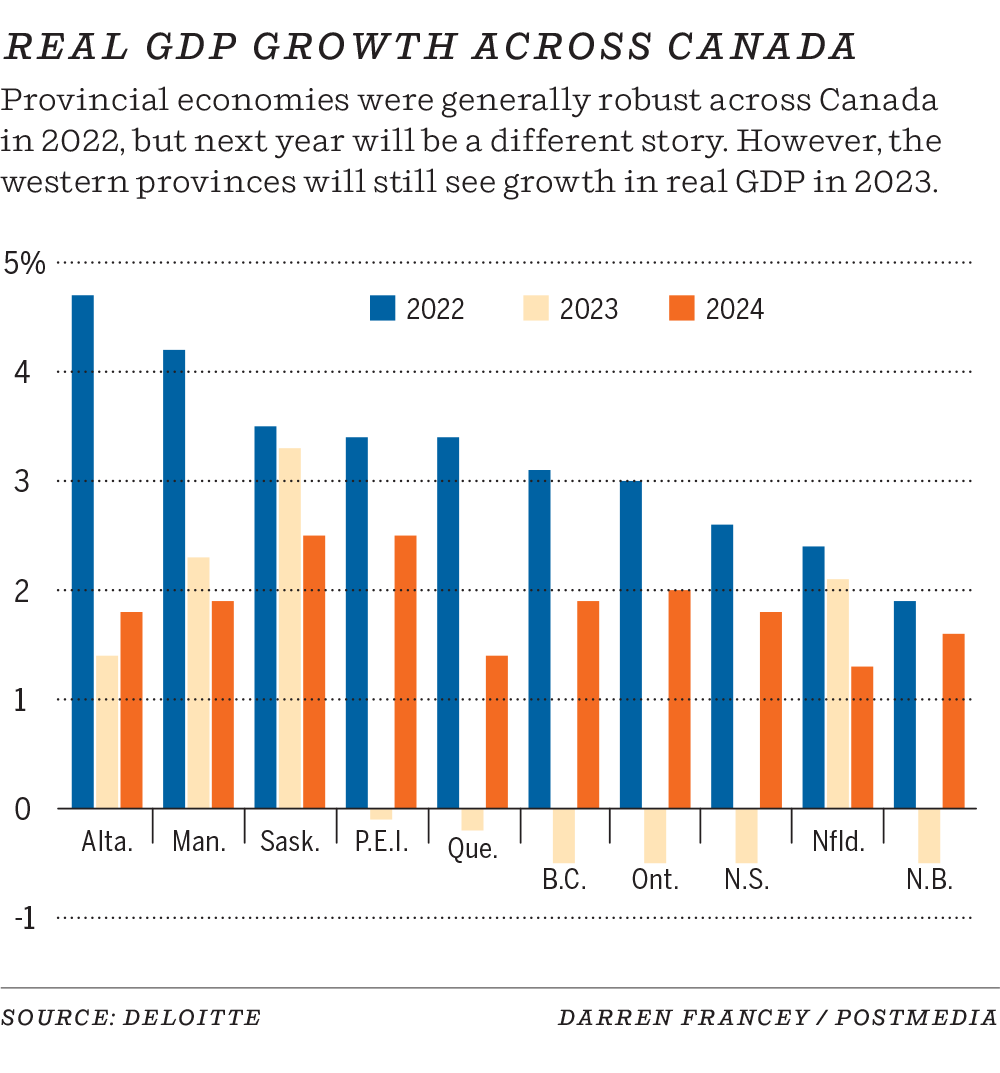According to Deloitte's latest economic outlook, Alberta will avoid a recession over the next year, a claim Canada will not be able to make as a whole

Article content
Alberta, powered by its resource sector, is expected to be an economic outlier as much of Canada is forecast to slip into recession at the end of this year.
Advertisement 2
Article content
According to Deloitte’s latest economic outlook, released Wednesday, Canada will enter a slight, two-quarter recession in the fourth quarter of 2022 and the first quarter of 2023. Alberta, Saskatchewan and Manitoba, however, are all forecast to maintain positive real GDP growth.
Article content
Alicia MacDonald, senior manager at Deloitte, said it is a reversal of fortune from the recession in 2020, when the Prairies were hit by the pandemic, the bottom dropped out on energy and there were multiple agricultural crises.
Article content
“When we look at 2022 and the prospects this year, we’re really seeing everything kind of come together on those fronts,” she said. “The energy sector, the sharp reversal in fortunes, from a budgetary perspective in Alberta, has been very surprising . . . and that is driven by the oil and gas revenues.”
Advertisement 3
Article content
The outlook has Alberta with the highest real GDP in Canada in 2022 at 4.7 per cent, but slipping to 1.4 per cent in 2023 before rebounding slightly to 1.8 per cent in 2024. Non-Prairie provinces are expected to struggle in 2023 before rebounding to positive growth in 2024 — Newfoundland and Labrador is the exception, with growth expected to mirror the Prairies due to its resource-dependent economy.
Article content
Charles St-Arnaud, chief economist for Alberta Central, said Alberta will likely still experience a considerable slowdown in the economy over the next couple of years, driven by having the third highest consumer debt loads in Canada. With inflation still high and interest rates expected to go up again in October — Deloitte is predicting another 50 basis points — Albertans are expected to exercise more budgetary restraint.
Advertisement 4
Article content

Varcoe: Poloz says no one knows whether Canada is in for a 'soft landing' or a turbulent recession

'A real turnaround': Alberta continues population gains from across Canada

'Dr. Doom' Roubini expects a ‘long, ugly’ recession and stocks sinking 40%

'All but set in stone': More economists join chorus predicting a Canadian recession
For the retail sector, it could mean a less-lavish Christmas shopping season than hoped.
“Higher costs for everything have been squeezing household budgets,” said St-Arnaud. “There’s a big decline in purchasing power and consumers will have to do some choices in terms of where and how do they spend. There’s some discretionary spending that won’t happen. Big spending on cars, furniture, appliances, might have to be delayed. Part of the slowdown of the economy is that you’ll see weaker consumer spending as we get into the end of the year.”
Advertisement 5
Article content
But data suggests that higher interest rates are starting to have an effect on cooling inflation, though St-Arnaud said the hikes likely are not done — he agrees with the prognostication of a 50-basis-point bump next month and says there could be an additional 25-point increase before the end of this year.
“We saw some moderation in recent months, but that was mainly due to an easing in gasoline prices,” said St-Arnaud. “(The Bank of Canada) still needs to continue to increase interest rates, but we’re getting to that peak in terms of how much they’ll increase.”
Alberta remains one of the most affordable provinces in the country, which is credited with continued net positive interprovincial migration. In the second quarter of 2022, the total was 9,857 for a fourth-consecutive quarter of positive results. In that time, 23,132 Canadians relocated to Alberta; 15,208 in 2022.
Advertisement 6
Article content
Jobs, Economy and Innovation Minister Tanya Fir said that migration is critical to the growth of the economy, to fill gaps in the labour force.
“It’s so important to have people coming in,” she said. “All of these industries, whether they’re the traditional ones or the more growing and emerging ones, are going to need the skilled workers. These positive migration numbers are a great indication that our goal to get these skilled positions filled is going to come to fruition.”
The last time there were four consecutive quarters of net-positive interprovincial migration to Alberta was the third quarter of 2014 to the second quarter of 2015 — also the last time there were four-digit positive gains.
Fir pointed to affordable housing, lower taxes and diversified job opportunities as the draws. Many people are coming to Alberta from Ontario and B.C., where the province has rolled out its Alberta is Calling campaign.
Advertisement 7
Article content
While oil and gas remain the province’s main economic drivers, other sectors have also begun to pick up the slack, including film and television production, record investment in the tech sector, a rebound in agriculture and a growing service industry.
This has been exemplified by recent announcements such as De Havilland announcing plans for a massive manufacturing plant in Wheatland County and Infosys doubling the number of positions for its new office in downtown Calgary to 1,000. There has been further investment in hydrogen production, lithium extraction and agri-sciences.
One positive of the impending slowdown is Deloitte is not expecting employment to bottom out, as it often does in a recession. MacDonald said the current tight labour market will help mitigate some of these pains.
“If you’re looking at laying off staff, you have to ask yourself, ‘how easy is it going to be to get these staff back when demand starts to pick back up?’ ” she said. “We think employers are going to hold on to their employees a lot longer than they normally would during a period of slowdown, just because it’s been so difficult to find the right skills for the jobs that are out there.”
Twitter: @JoshAldrich03
Recession proof? Alberta economy expected to avoid Canadian GDP shrinkage - Calgary Herald
Read More





No comments:
Post a Comment